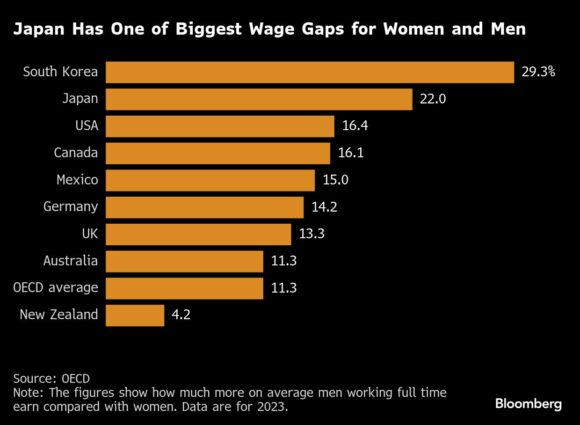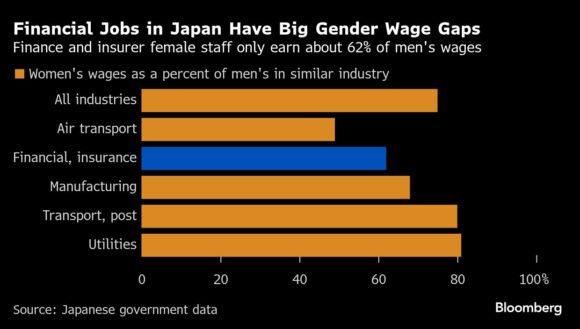Japan’s biggest financial firms are abolishing decades-old employment practices that kept women off the corporate ladder.
Nippon Life Insurance Co., Japan’s largest insurer, and MUFG Bank Ltd., a unit of the nation’s biggest banking group, are among firms that in recent months scrapped a clerical job category that consisted almost exclusively of women, who were paid less than those on the career track.
Merging the two job types may increase opportunities for women to advance to more senior positions. Japan’s latest move to catch up with the West comes even as US companies start to reverse some of their diversity policies, under pressure from President Donald Trump’s administration.
The divided system was long used in other industries too, resulting in Japan having some of the biggest pay gaps between women and men in the world, but the financial sector is one of the worst offenders and has been slow to change. Work was often structured in the past so that women were expected to stay at their jobs for just a few years, marking time before marriage. That’s become rare recently, but the system has stayed in place.

Women in Japan earned 75% of men’s wages across all industries in 2023, compared with 62% for financial firms and insurers, according to data from a government-led panel on women in the workplace. That figure dropped to 50% for Mitsubishi UFJ and just 39% for Nippon Life in the fiscal year that started in April 2023.
A legal requirement to publish data on gender pay gaps introduced in 2022 has made the disparities more visible, according to Mioko Bo, an associate fellow at NLI Research Institute.
“HR departments now know they have to change — they are being scrutinized both by potential recruits and investors,” she said.
In Japan’s postwar high economic growth era, men were expected to work long hours while women stayed at home after spending a few years working. The financial sector in particular was a big employer of women to handle the huge amounts of paperwork the firms needed before automation took over.
Even after the law was revised in 1997 to forbid hiring practices that discriminated against female workers, almost all jobs in the lower-paying category still went to women. Now, jobs focused on paperwork and cash are rapidly disappearing.
Other firms in the financial sector including Dai-ichi Life Holdings Inc.,Sumitomo Mitsui Financial Group Inc. and Mizuho Financial Group Inc. have already merged the job categories. The nation’s biggest bank and insurer taking that step is a sign that the sector is finally getting more serious about reducing gender inequalities.
While Japan’s economy is among the world’s largest, the nation trails other rich countries and even some emerging economies in areas like the proportion of executives that are female.
“Given Japan’s urgent need to address labor shortages and secure talent, we believe the promotion of diversity is likely to continue,” JPMorgan strategists including Rie Nishihara wrote in a report. “Promoting diversity by raising the labor participation rate of women, appointing more women to senior positions, and extending the employment of senior citizens” can help ease worker shortages that weigh on economic growth, they wrote.
Japanese companies with a higher portion of female executives also tend to have better returns on equity, according to the report.
Not all of the lower-paid staff are happy about their jobs becoming more career-oriented. Nobue Kanba, managing director and head of human resources at Mitsubishi UFJ Bank, said some women expressed concerns when she visited branches to explain the integration, which comes as the need for tellers diminishes quickly.

Past research suggests that pay raises alone may not satisfy female employees. They’re often not keen about longer hours at the office that may worsen work-life balance, and are concerned about more responsibilities and stress as well as the possibility they will be asked to move, forcing them to leave behind familiar surroundings and their children’s favorite schools.
Even after the merger, vast disparities in work ability will remain between long-serving female clerical workers and career-track employees. Researcher Bo said it would be crucial to help these women develop their skills rather than write them off.
In rare cases, women have managed to build impressive careers despite starting their working lives in the clerical category. Kyomi Nakakura at Nippon Life was promoted to executive officer in March, one of the company’s top positions. She’s one of a tiny group of people who have made it to that rank from the clerical track.
When she was hired straight out of high school in 1984, one of her daily tasks was to serve tea to colleagues, remembering which cup was whose, and then washing them at the end of the day.
Nakakura initially balked when her boss urged her to apply for a career-track position, saying that handling the new tasks seemed impossible for someone like her. But she overcame her reluctance and ascended the company ranks through a series of positions, including managing a sales office.
Other women from the clerical track may also face psychological hurdles to taking on more responsibility, Nakakura said. “There’s a need for people that give them support,” she said. “I would like to be one of them.”
Photograph: Signage for MUFG Bank Ltd., a unit of Mitsubishi UFJ Financial Group Inc. (MUFG), outside one of the bank’s branches in Tokyo, Japan, on Tuesday, June 25, 2024. Photo credit: Kiyoshi Ota/Bloomberg
Related:
Copyright 2025 Bloomberg.








